Today we publish the third part of the “Bakhchisaray-Berlin Express” memoir series of Elnara Letova, a Ukrainian Crimean Tatar for who the war began with the occupation of Crimea in 2014.
In Kyiv, I opened the so-called “FOP”, which is basically individual entrepreneurship, and continued to work for the same company, only reporting directly to the New York office. Already in 2015, I learned what it was like to work from home remotely, almost exactly the same as in the corona conditions when most of the tech people faced this only in 2020. I worked alone, although at least ten more of our employees left for Kyiv, five of whom would not mind continuing to work for the same company, only from Kyiv. For quite some time, I tried to persuade my American board of directors to open an office in Ukraine - having a small team of employees of the same company gathered in Kyiv could have significantly reduced the time to find new employees and bring them up to date. The idea of opening an office somewhere else besides Krasnodar seemed to me quite reasonable in order to somehow diversify the risks and “put eggs in different baskets”. I was sure that if today the sanctions affected Crimea, tomorrow they could affect the whole of Russia, and throwing all efforts exclusively at the Krasnodar office seemed to me a completely strange decision of the management.
But to my surprise, somehow everything worked out so well at that time that the Krasnodar office then flourished for the next few years. And I was called a doomster again. Just like when, in 2014, during the annexation of Crimea, I shared my feelings with horror and talked about the scenario of World War 3, being like people, hello? Don't you understand that doesn’t smell good at all? In the meantime, many of my friends and colleagues, with joy and pride, or just for fun, took pictures with these “green men” in balaclavas and posted their photos on the Russian analog of Facebook, Vkontakte. It seemed to me that I was in some kind of dystopian movie and I simply could not believe that everything that was happening in my homeland was possible in the 21st century. Perhaps if Russia "calmed down" by seizing Crimea, then my panic would have really been completely groundless. The world back then, was very worried, of course, but still “swallowed” it and the return of Crimea to Ukraine appeared on the agenda again only with the start of a full-scale war.
I visited my relatives in Crimea every three or four months, back then it was still possible to get to Novooleksiivka or Kherson by train, and from there by bus or taxi to any city in Crimea. And in Crimea, everything seemed to be quiet and calm, but the air had become so heavy that you could just cut it in bricks. Just before our eyes, Crimea from the main Ukrainian resort turned into a Russian military training ground.
When I studied at the Crimean KNEU, we intensively studied the issues of European integration of Ukraine, and for us, international economists, there was virtually no other vector for the development of Crimea, like Ukraine as a whole. We talked about Russia as an important neighbor who we needed to maintain a good relationship with. Russia was respected and even set as an example. Due to the fact that after the collapse of the Soviet Union, the West pumped it up with investments, and Russia managed to advance quite far in some sectors. Thanks to the propaganda machine, which, as we now know, was working at full capacity even then, the quality of life there seemed much better than ours. Naively, we took it at face value, and even more naively, we believed that Russia, like Ukraine, would soon be democratized and integrated into Europe, or at least trying to do so. It was mainly teachers of advanced age (who lived their best years in the Soviet Union) who could bring up the topic of the customs union with Russia, Belarus, and Kazakhstan trying to convince us it was a good idea. Like “You need to be friends with the brother countries and build a bright future together! But you young people here don’t understand anything at all, you keep talking about some weird European values.” When I graduated in 2012, it seemed to me that my country was awaiting a long but necessary path of European integration and reforms, economic growth, and improvement in the welfare of the population. But 2014 put an end to everything we believed in as students.
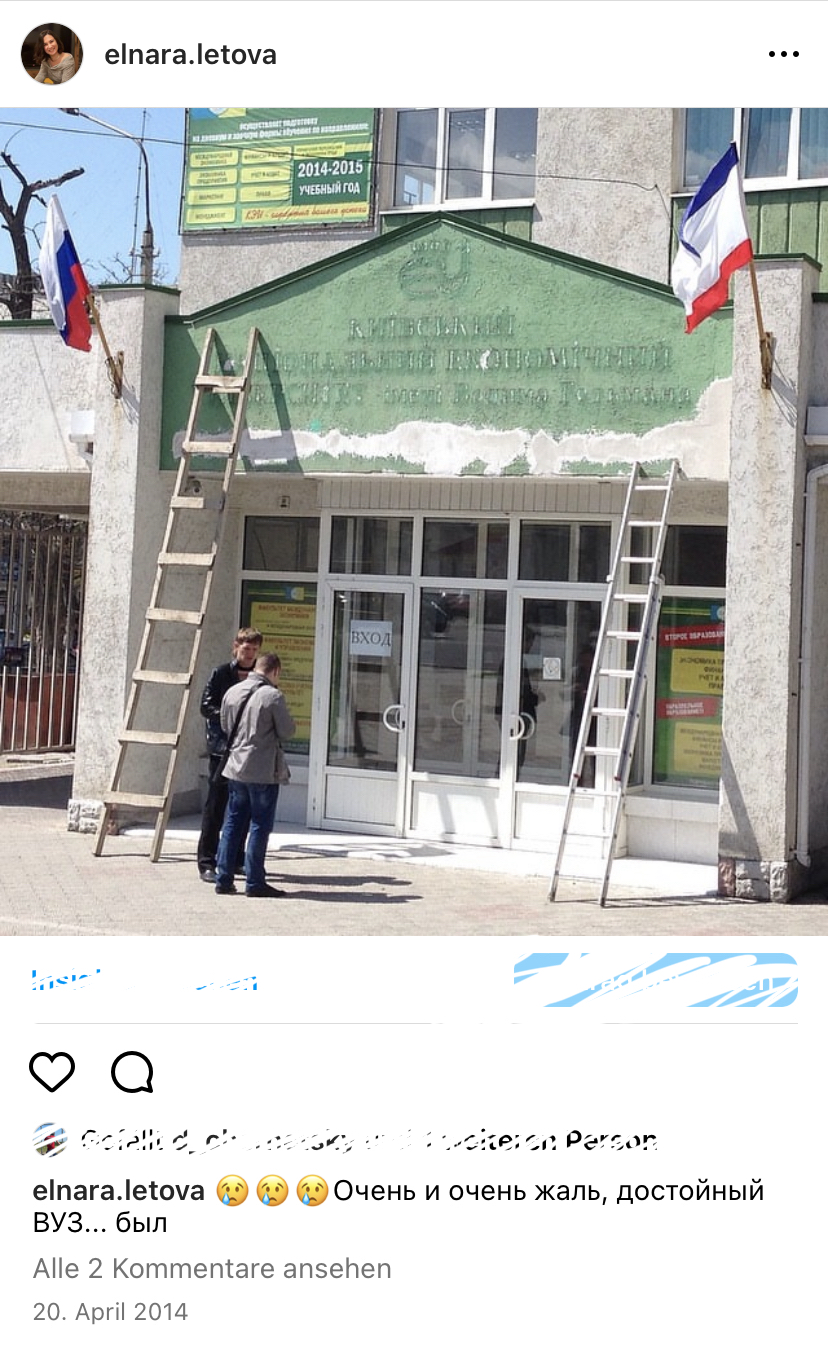
Crimea was a rather depressive region in Ukraine, and one could often hear from jingoists “What did Ukraine do for Crimea? Nothing!". Well, here is question number one - how much could Ukraine at that time do for any other region? Question number two, what did the people in Crimea do to somehow change the situation? Nothing in particular. Who wanted to take responsibility and risks? It is always easier to continue to take an infantile position and complain. And question number three, rhetorical one - why did they decide that the “regionals” (members of the pro-Russian political party “Party of Regions” which is now banned in Ukraine) who remained in power in Crimea and changed their shoes into United Russia (the largest All-Russian Political Party), would suddenly begin to care about the welfare of the region, and not, as usual, about their own pockets? Here's the same thing.
2014 showed how much I loved my country. With all its complexities and with all its shortcomings. Yes, I allowed myself some rude statements (as for me, completely justified) about theft and corruption, for example. But this absolutely did not mean that because of this I want Crimea to become part of another country. And as I already said in the first chapter, people shouting “Crimea is Russia!” always seemed to me either intellectually handicapped, mentally unhealthy, or totally out of their minds and therefore nostalgic for the soviet union old people. In general, they all seemed to me to be a rather marginal group of the Crimean population, like 5% tops. Little did I know. But the thing is: if you don’t like something, do something to change the situation. If it doesn’t work out, deal with it or move someplace else. The phrase “Suitcase - Trainstation - Russia” was a common reply for those who did not like it in Ukraine. But for some reason, many Russians who do not live in Russia often want to drag Russia into the country where they live. Instead of initially not leaving it and not betraying such a beloved fatherland, or just moving back to Russia and living there.
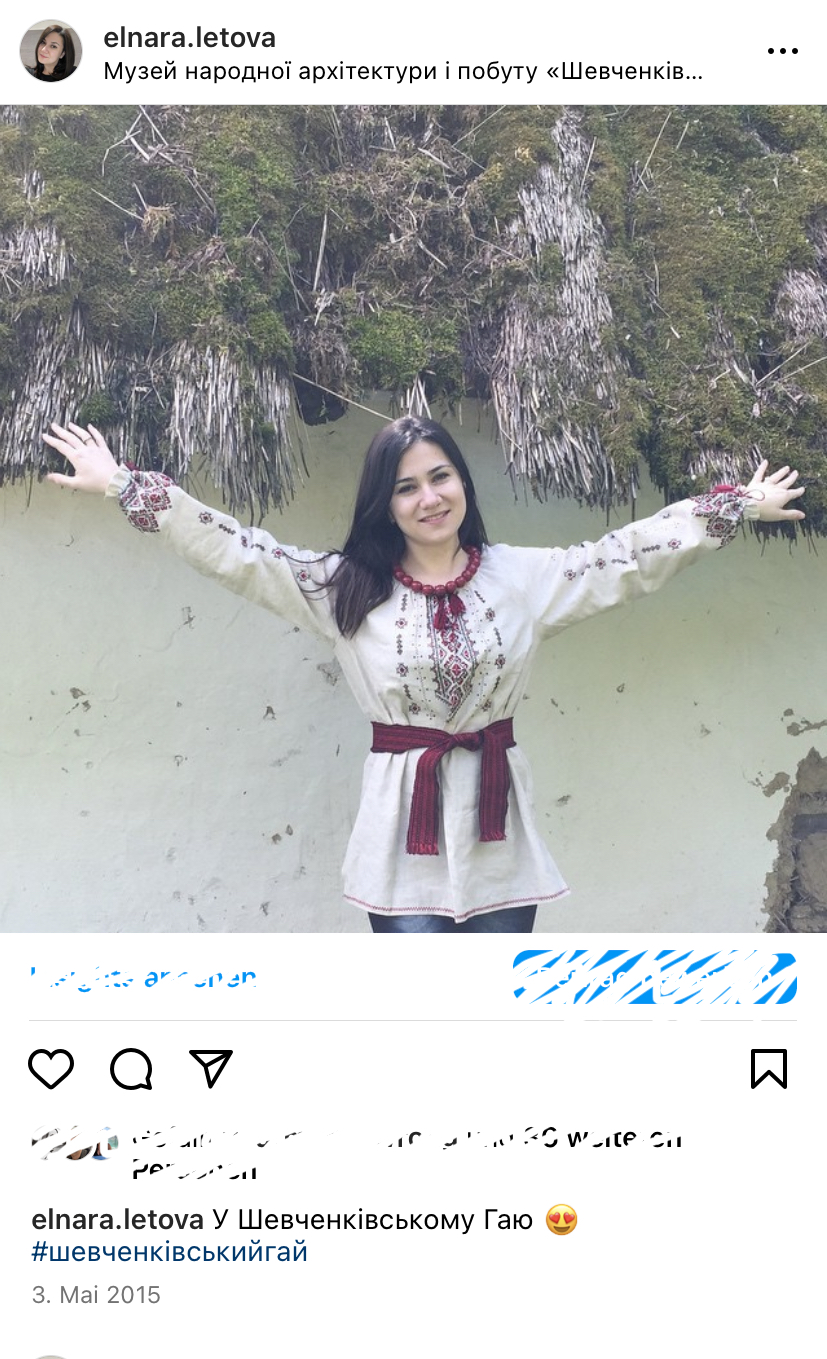
During the hastily organized pseudo-referendum, I had the feeling that people with a Crimean registration in a Ukrainian passport were taken like peasants with a plot of land. It didn’t matter whether you were for or against, the fact of being registered in Crimea, I emphasize, in a Ukrainian passport, automatically made you a Russian, even if you did not hold a Russian passport. And even if you haven’t lived in Crimea for 20 years. I also remember the confusion of my nephews, elementary school students, when they were told at school that their capital was now Moscow, not Kyiv. Here, a whole generation has grown up in independent Ukraine, and if for my parents, and grandparents, Moscow meant at least remotely, but something dear, for us Moscow is the capital of a neighboring state, period. Moreover, as a child, Moscow seemed to me to be an incredibly cool city, and I always wanted to visit it and maybe even live there for a while. Many Ukrainians went to work in Moscow, and the Muscovites themselves, coming to the Crimea, were just flushing with money. For them, Crimea was more than affordable, and in some places, to their surprise, generally cheap. Up until after the occupation, when life in Crimea has become more expensive than in Moscow itself.
As I mentioned at the beginning when I moved to Kyiv, I continued to work for the same American company, and my American friends who left Crimea in a hurry went to Moldova. For some time they did not know what to do next and planned to leave for Eskisehir, a city in Turkey, where out of almost 900 thousand people, 80% are the Crimean Tatars. The descendants of those who fled from the Crimea, first from the Whites, and then from the Reds. In addition to the fact that my friends had a project dedicated to the Crimean Tatars, they were imbued with our culture and history and made many friends. They admired the Crimean Tatar hospitality and were interested in our mentality. Which, for me, is a hell of a mixture of Soviet thinking and conservative Islam, and it really arouses at least some naturalistic interest, especially for progressive-thinking people, especially from the West. But that is another story. And I told those American friends about the Crimean community in Kyiv and sent them some links to several Kyiv Crimean Tatar groups on Facebook. They were very surprised to figure out that a sufficient number of Crimean Tatars already lived in Kyiv at that time. As a result, my friends moved to Kyiv, and when I moved to Kyiv with my (now ex) husband, we lived with them for several months until we found an apartment for ourselves.
Almost immediately after the move, I began to realize how much I miss Crimea. Yes, Crimea, which I always wanted to leave. And most of all, I began to miss the “Crimean Tatarness” and everything that was connected with it. Only when I moved to Kyiv, I learned the “Ant Etkenmen” (Crimean Tatar anthem) text. Only when I moved to Kyiv, I first went to the meeting on May 18, dedicated to the deportation of the Crimean Tatar people in 1944. Only when I moved to Kyiv, I again took up Crimean Tatar choreography, which I had to say goodbye to 10 years ago due to a spinal injury.
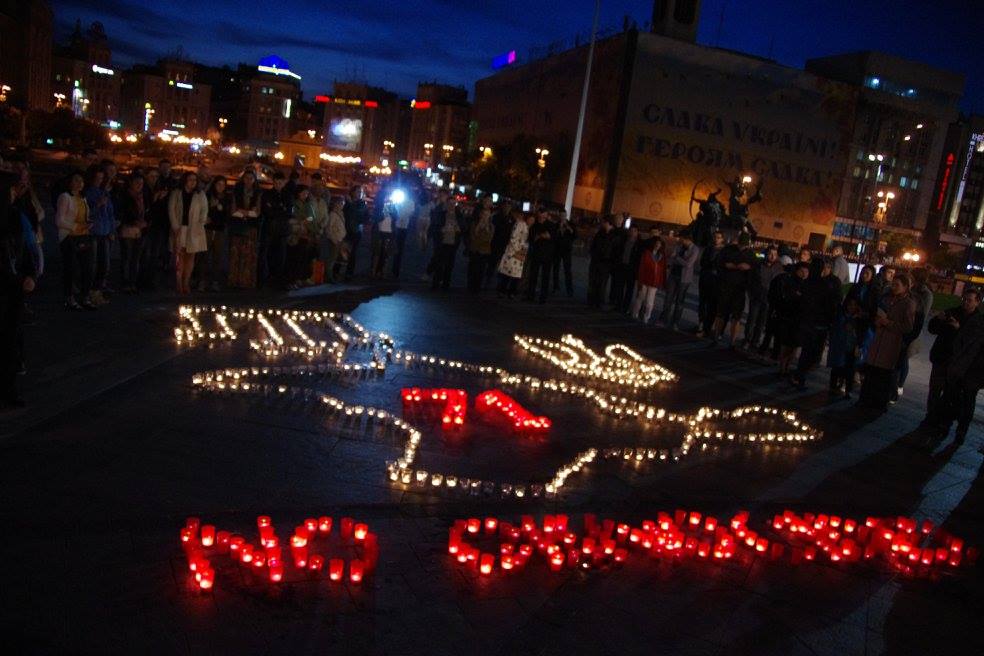
In Crimea, the rallies on May 18 seemed to me a relic of the past and, honestly, I myself felt uneasy if I saw the crowd shouting “Allahu Akbar” or something like that on the video of the rallies. Yes, the phrase “Allahu Akbar” itself means nothing more than “praise to the Almighty”, but unfortunately, after a series of terrorist attacks, this phrase acquired an extremely negative connotation and actually began to mean a call for murder. When the crowd chanted Millet, Vatan, Qirim (People, Motherland, Crimea), it was very appropriate, because this is the slogan of the people who returned from deportation and were exhausted by injustice. But shouting “Allahu Akbar”, perfectly understanding what associations this phrase can cause, was a bit too much to my liking. In the last years before the occupation, the tradition of lighting candles in memory of those who died during the deportation appeared, and it seemed to me a more appropriate format for commemorating the mourning event.
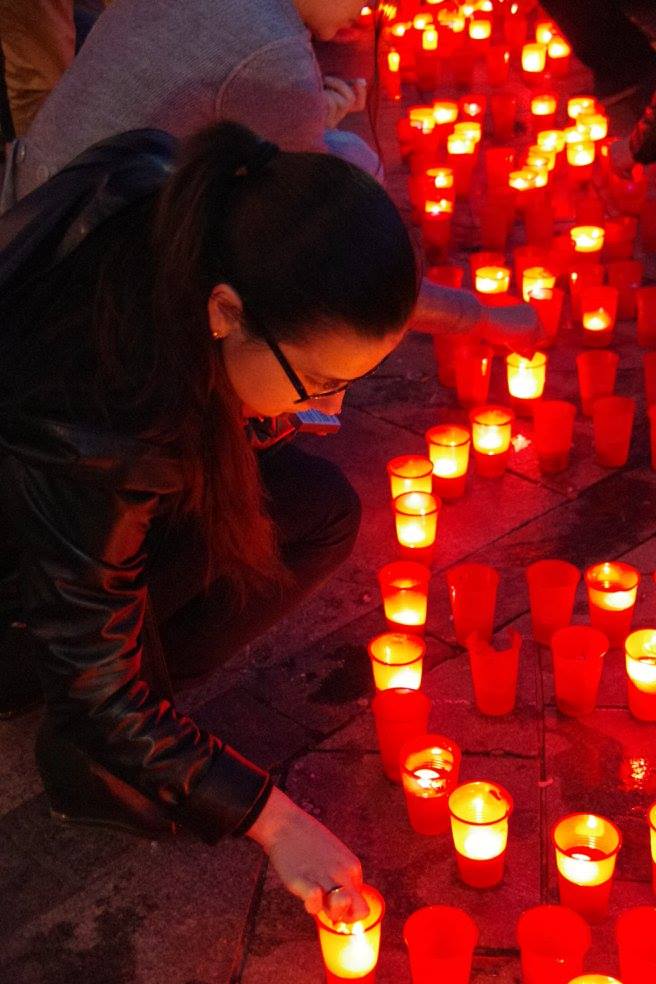
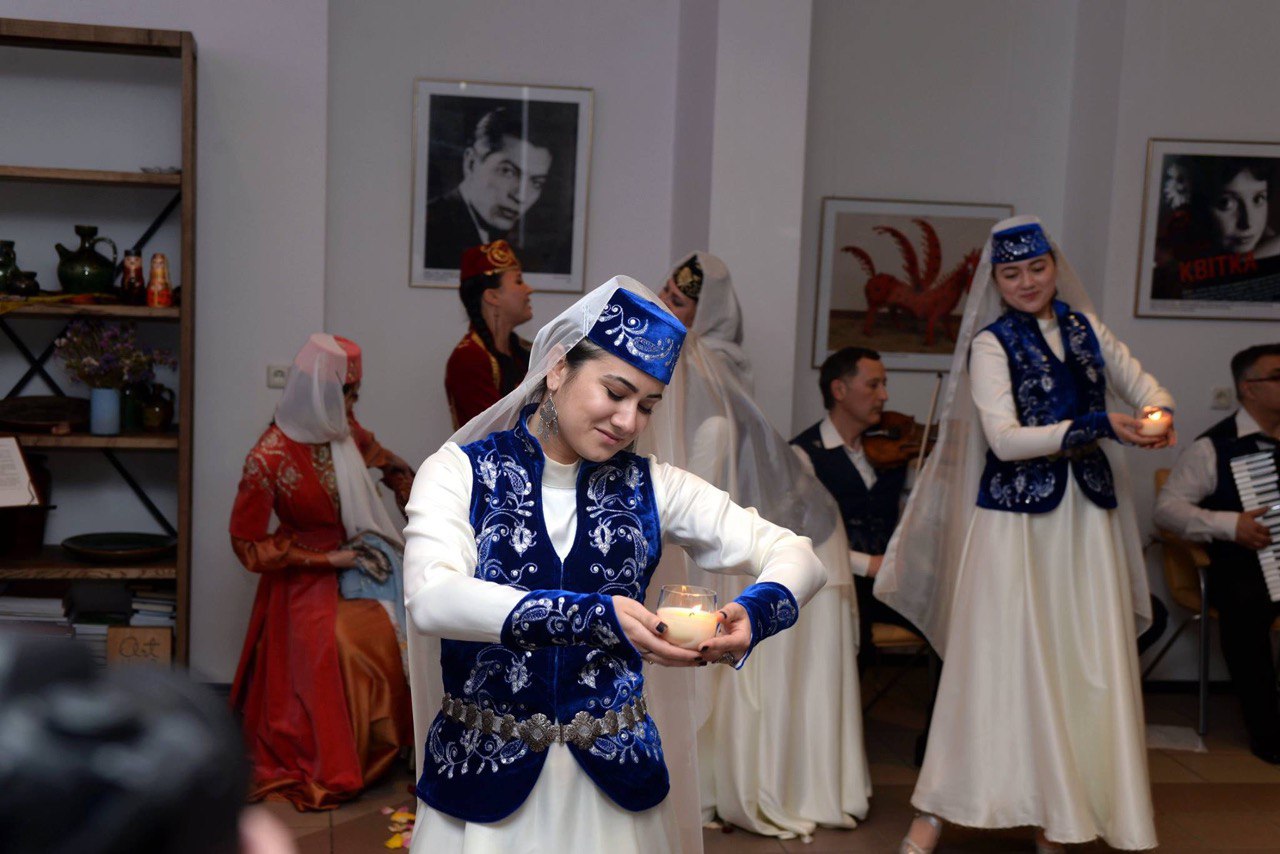
And our small dance group led by Elnara Khalilova in 2016 became an ensemble called “Badem” (Almond from Crimean Tatar), we even sewed concert costumes and performed at some events, mainly in Kyiv. And later, in 2017 we were invited to the International Black Sea Folk Festival in Georgia, where we performed together with Alie Khadzhabadinova and Marina Krut. At that moment it seemed very unfair that we can easily find ourselves in another country at the festival in a couple of hours, while in order to get to our homes in Crimea we needed to endure 10 hours on the bus and bumpy Ukrainian roads weren’t making it any easier, and then face all the delights of crossing the Crimean border. Which ate up not only tons of your time and nerve cells, too but was also an absolute lottery. Predicting how many hours you would have to stay at the border, whether they would let you through at all, or turn you back to Ukraine was simply impossible.
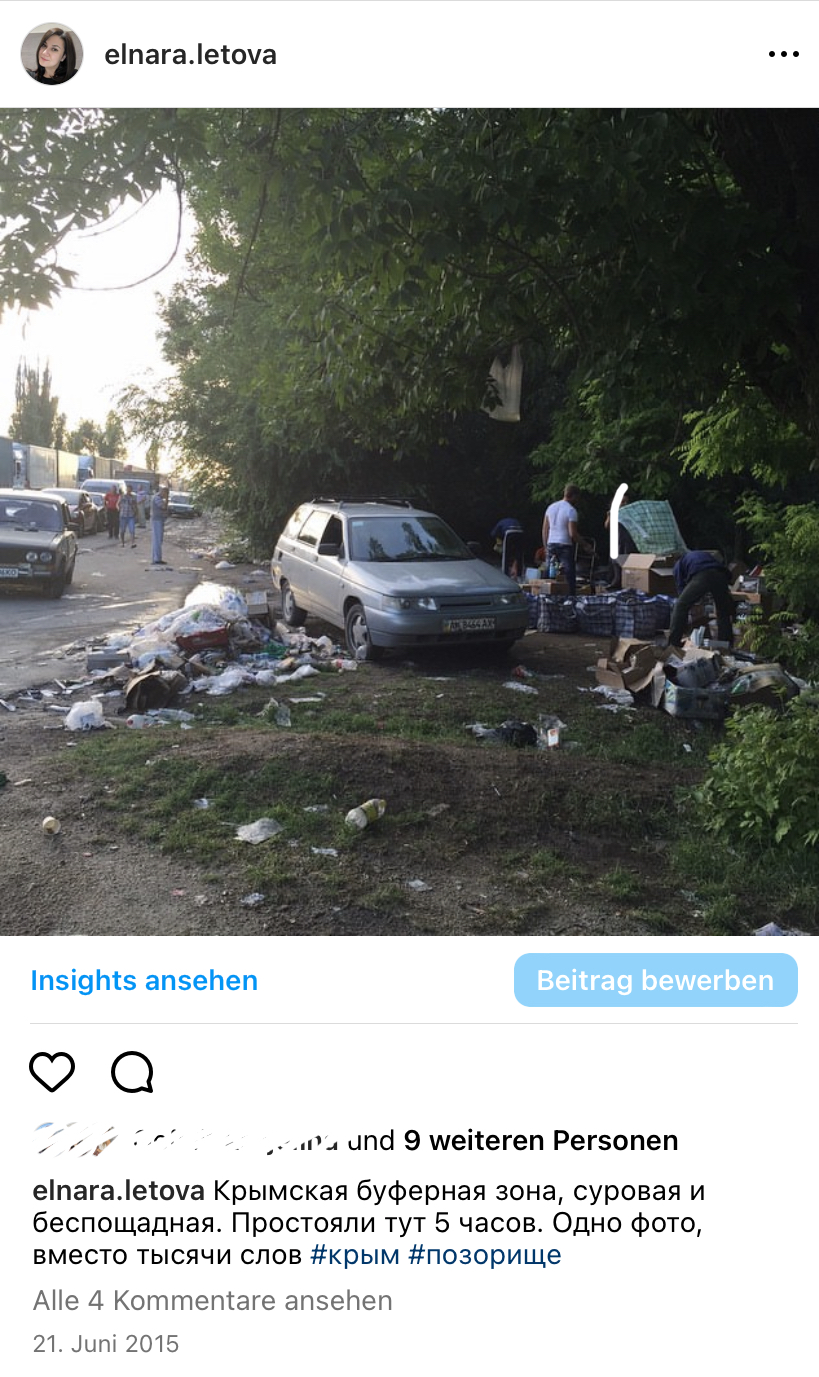
To be continued…
Read previous chapters:
Bakhchisaray-Berlin Express: Part 1. "Simferopol" Station
Bakhchisaray-Berlin Express. Part 2: “Simferopol-Kyiv”